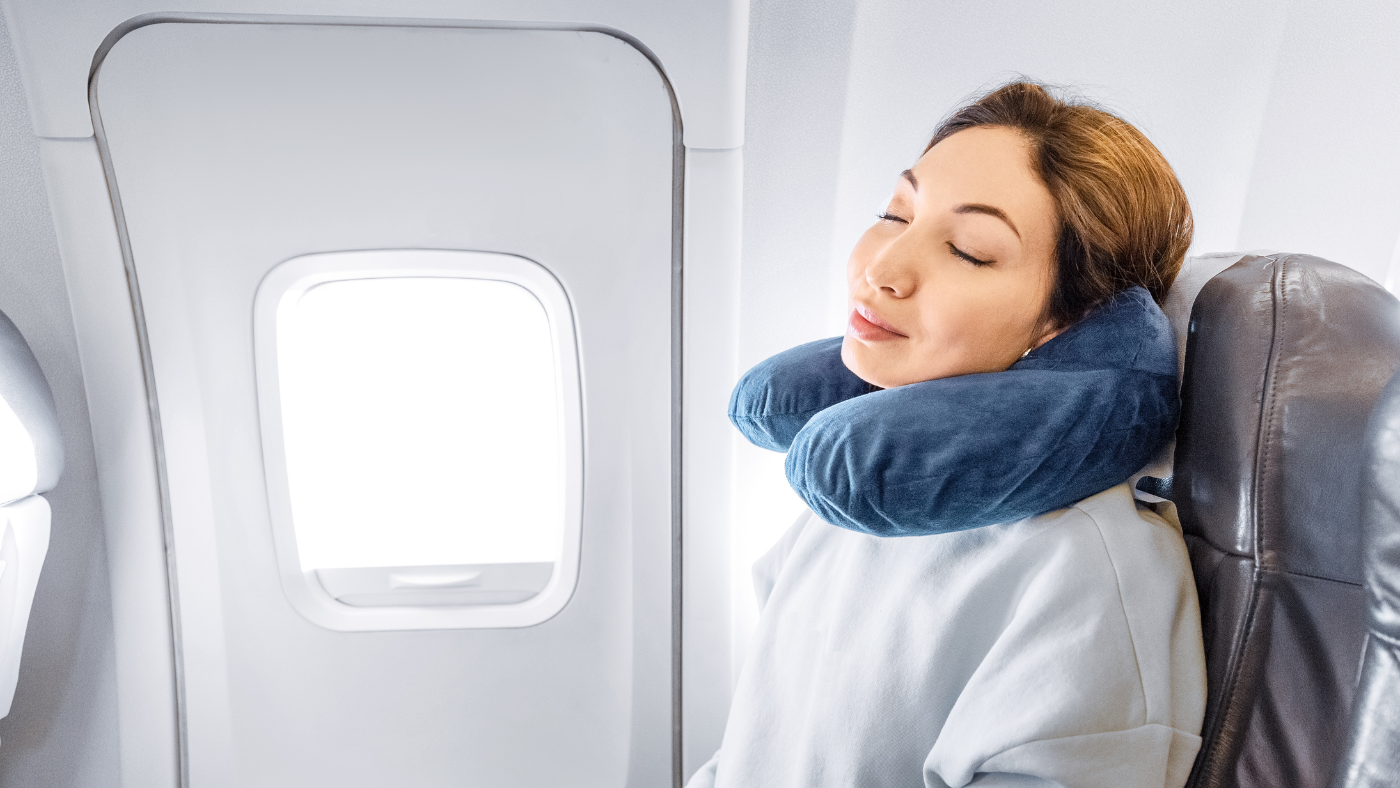Here are some tips to combat jet lag, which can often be experienced when traveling distances, to Australia due to the time difference;
Prior to your flight gradually adjust your sleep schedule a days in advance by either going to bed and waking up earlier or later depending on the direction of your travel.
Stay hydrated by drinking plenty of water during your flight and avoid consuming alcohol and caffeine.
Keep yourself active and stretch periodically during the flight to prevent stiffness and fatigue.
If its nighttime at your destination try to get some sleep on the plane.
Once you land in Australia make an effort to quickly adapt to the time by staying active during daylight hours and getting exposure to sunlight.
Avoid taking daytime naps as they can disrupt your nighttime sleep schedule.
You may consider using supplements as a means of regulating your sleep patterns.
Employ relaxation techniques like meditation or deep breathing exercises to minimize stress and promote relaxation.
Opt for meals of heavy or greasy foods that might leave you feeling sluggish.
Allow yourself time for recovery, from jet lag. Adjusting to the new time zone before engaging in physically demanding activities.
These strategies should assist you in mitigating jet lag symptoms.
Avoid jet lag
Jet lag is a common problem for travelers who cross multiple time zones, causing symptoms such as fatigue, irritability, difficulty sleeping, and general malaise. However, there are several strategies that can help minimize the effects of jet lag and make the adjustment to a new time zone smoother. One effective method is to gradually shift sleeping and eating patterns a few days before the trip. This can be done by going to bed and waking up earlier or later, depending on the direction of travel. Additionally, it is important to stay well-hydrated before, during, and after the flight to counteract the dehydrating effects of air travel. Drinking plenty of water and avoiding excessive intake of caffeine and alcohol can help prevent symptoms of jet lag. Another useful tip is to try to get some exercise during the flight or upon arrival. Stretching and moving around the cabin can improve blood circulation and reduce muscle stiffness. Upon arrival at the destination, it is recommended to adapt to the local time as soon as possible. This means resisting the urge to take long naps or go to bed too early. Instead, staying active during daylight and avoiding exposure to bright lights at night can help reset the internal body clock and promote a quicker adjustment to the new time zone. Additionally, some travelers find it helpful to take melatonin supplements or use light therapy devices to regulate sleep patterns. Overall, by following these tips and strategies, it is possible to avoid or minimize the symptoms of jet lag and enjoy a more comfortable and productive journey.
Beat jet lag
Traveling across time zones can be exciting and adventurous, but the dreaded jet lag can often put a damper on the experience. However, with a few simple strategies, it is possible to beat jet lag and make the most of your trip. First and foremost, it is important to adjust your sleep schedule prior to departing. Gradually shifting your bedtime and waking up time closer to the time zone of your destination can help your body adapt more easily to the new time zone. It is also crucial to stay hydrated throughout the flight as dehydration can worsen the symptoms of jet lag. Drinking plenty of water and avoiding alcoholic and caffeinated beverages can help counteract the effects of air travel. Additionally, during the flight, it is beneficial to move around and stretch your muscles to prevent stiffness and improve blood circulation. This will not only help reduce the risk of developing blood clots but also keep you more alert once you reach your destination. Once you arrive, it is essential to expose yourself to natural light as much as possible to help reset your internal body clock. Spending time outdoors during daylight hours and avoiding bright artificial light at night can aid in adjusting to the new time zone. Lastly, adapting to the local meal schedule can also be helpful in beating jet lag. Eating regular, balanced meals at the appropriate times can signal to your body that it’s time to adjust to the new time zone. By implementing these strategies and being mindful of your body’s needs, you can successfully beat jet lag and make the most of your travel experience.
Overcoming Jet lag after arriving
Jet lag after landing refers to the experience of travelers who have crossed multiple time zones and are now facing disruptions, in their sleep wake cycle. This condition can lead to feelings of tiredness trouble sleeping, confusion and difficulty focusing. The severity and duration of jet lag can differ depending on factors like the number of time zones crossed, travel direction individual health conditions and coping methods used. Jet lag can also affect functions such as digestion, metabolism and hormone production. Upon arrival at the destination it’s common for individuals to feel exhausted and disoriented as their bodies adjust to the time zone. The circadian rhythm that regulates our sleep patterns takes some time to synchronize with the time. Experts recommend adjusting sleeping and eating routines in the days leading up to travel. After landing exposure to light and engaging in activity can help reset our internal body clock. Some people may opt for medications or natural remedies, like melatonin to alleviate jet lag symptoms.
Although there is no guaranteed cure adopting sleep habits staying hydrated and limiting caffeine and alcohol intake can help you adjust to a time zone more quickly. Dealing with jet lag can be. Have an impact, on the initial days of your trip. It’s important for travelers to be aware of these effects and take steps to minimize their impact.
After you arrive at your destination
Many travelers experience jet lag when they land in a time zone. This happens when our bodys natural internal clock gets disrupted due to travel across time zones. As a result our body clock becomes out of sync with the time at the destination. Common symptoms of jet lag include fatigue, sleep disturbances, difficulty concentrating, irritability, digestive issues and overall discomfort. The intensity of these symptoms can vary depending on the individual and the direction of travel ( westward). Jet lag tends to be more severe when traveling eastward because its harder for our bodies to adjust to days. Factors such, as age, overall health and the number of time zones crossed can also influence the severity and duration of jet lag.
Although its not possible to prevent jet lag there are strategies that can help minimize its impact. These strategies include adjusting your sleep schedule a days before you travel, staying hydrated before and, during the flight avoiding alcohol and caffeine exposing yourself to light at your destination and gradually adapting to the local time zone when you arrive. Its also recommended to engage in activity and refrain from taking long naps in order to reset your bodys internal clock. Overall jet lag can greatly affect your travel experience. With planning and self care you can reduce its effects and enjoy a smoother transition into the new time zone.
Tips, for overcoming jet lag
Jet lag is an issue faced by travelers who cross time zones. It can result in fatigue, irritability and an overall sense of discomfort. However there are strategies you can employ to minimize the effects of jet lag and make adjusting to a time zone easier.
Firstly it’s important to adapt your sleep schedule to the time zone a few days prior to your trip. This means going to bed and waking up either earlier or later depending on the direction of your travel. By doing you allow your body to slowly acclimate to the time zone and reduce the impact of jet lag.
Secondly staying hydrated is crucial. Air travel tends to dehydrate the body exacerbating the symptoms of jet lag. To counteract this make sure you drink plenty of water before during and after your flight. It’s also advisable to avoid consuming caffeine and alcohol as they can disrupt your sleep patterns.
While on board the plane try to get much rest as possible by wearing comfortable clothing using noise cancelling headphones and bringing along a travel pillow for neck support.
Lastly expose yourself to natural light as much as possible upon reaching your destination. Sunlight plays a role, in regulating our bodys clock; therefore spending time outside during daylight hours can assist in readjusting more efficiently.
Here are some tips to help you reset your bodys clock and minimize the effects of jet lag. It’s important to be patient, with yourself and give your body time to adjust. Don’t push yourself hard to jump into activities or work. Take it easy relax and gradually acclimate yourself to the time zone. By following these suggestions you can overcome jet lag. Fully enjoy your travels.
Jet lag while traveling
Jet lag is an experience for people when they travel across different time zones. It happens when our bodys natural rhythm, called the rhythm gets disrupted due to changes in time zones. This disruption can lead to mental symptoms that can interfere with our ability to function effectively. Feeling tired is one of the symptoms of jet lag since our bodies struggle to adapt to the new time zone. This fatigue may also cause difficulties in falling asleep or staying awake at times during the day. Moreover jet lag can affect our system resulting in issues like indigestion, constipation or diarrhea due to disruptions in processes. Additionally it may cause irritability. Make it challenging for us to concentrate or remember information accurately making tasks more difficult, than usual.
The level and duration of jet lag symptoms differ from person, to person. It usually takes a days for the body to fully adjust to the new time zone. There are strategies that can help minimize the impact of jet lag, such as adjusting sleep patterns before traveling staying hydrated avoiding caffeinated beverages and alcohol and spending time, in light during the day. However it’s important to acknowledge that jet lag cannot always be completely avoided, during flights that cross multiple time zones. Therefore it’s essential for travelers to anticipate effects of jet lag and plan their schedules accordingly to allow for rest and recovery upon reaching their destination.
How do I prepare for a long international flight?
Preparing for a long international flight requires careful planning and preparation to ensure a comfortable journey. Firstly, it is essential to pack all the necessary travel essentials. This includes passport, visa, boarding passes, and any other required documents. Additionally, one should pack comfortable clothing and shoes as it is crucial to be at ease during the flight. Another aspect of preparation is to pack an entertainment kit consisting of books, magazines, and electronic devices loaded with movies or TV shows. This will help pass the time and make the journey more enjoyable. Hygiene is also crucial during a long flight. Therefore, it is important to pack toiletries such as toothpaste, toothbrush, and face wipes. Staying hydrated is imperative during a long-flight, so carrying a reusable water bottle is advisable. Furthermore, it is essential to check luggage restrictions and weight limits beforehand to avoid any last-minute hassles at the airport. Additionally, it is advisable to arrive at the airport well in advance to allow enough time for security checks and boarding procedures. To ensure comfort during the flight, consider bringing a neck pillow, eye mask, and noise-cancelling headphones. Lastly, it is essential to plan for jet lag by adjusting the sleep schedule a few days before the flight. Consuming ample water and avoiding alcohol and caffeine in-flight can also help reduce the effects of jet lag. By following these preparations, one can be well-equipped and ready for a long international flight and make the journey smooth and enjoyable.
How can we prevent jet lag when traveling from the United States to Australia?
Jet lag can be a condition that occurs when crossing multiple time zones and it poses a difficulty when flying from the US to Australia due, to the significant time difference. However there are strategies that can help minimize or alleviate the symptoms of jet lag. One effective approach is gradually adjusting sleep patterns in the days leading up to the flight. By shifting bedtime and waking times closer to the destinations time zone our bodies can start adapting to the schedule. It is also crucial to stay properly hydrated throughout the journey. Dehydration can worsen jet lag symptoms so it’s essential to drink plenty of water and avoid alcohol or caffeine consumption as they contribute to dehydration. Another helpful method is avoiding meals during the flight. Opting for lighter easily digestible food options instead. This helps regulate digestion and promotes sleep, on board. Once arrived in Australia exposing ourselves to light and engaging in activities during daylight hours can assist in syncing our internal body clock with the new time zone. It’s also advisable not to take naps upon arrival as they may disrupt our sleep schedule further.
Instead try your best to remain awake until its time to sleep according to the time. Lastly some people have reported that taking supplements can be useful, in managing sleep patterns and helping with adjusting to the time zone. In general using a combination of these approaches can be really helpful, in preventing or reducing the impact of jet lag when traveling from the United States to Australia.
Drink water to prevent jet lag
By drinking water regularly during the flight, passengers can avoid dehydration and maintain their body’s equilibrium. Water helps to replenish fluids lost during the flight, and it also aids digestion and promotes healthy circulation. Moreover, water can help to combat the effects of high altitude and cabin pressure, which can further contribute to the onset of jet lag. Furthermore, drinking water can prevent the overconsumption of caffeine and alcohol, which are common on long-haul flights and can exacerbate the symptoms of jet lag. In addition to drinking water during the flight, it is important to continue hydrating once arriving at the destination. This will aid in adjusting to the new time zone and facilitate the body’s rehydration after a journey. Therefore, the simple act of drinking water can prove to be an effective and essential step in preventing and mitigating the symptoms of jet lag when traveling.
Noise cancelling headphones have become an effective solution, for dealing with the effects of jet lag. Jet lag often occurs when our bodies feel disoriented after traveling across different time zones. One of the contributors to jet lag is the disruption of our sleep patterns, during flights, where the constant noise can make it challenging to rest or relax. Thankfully noise cancelling headphones are here to save the day. These innovative devices use technology to block out sounds creating a peaceful and quiet environment that allows travelers to comfortably rest and sleep. By reducing surrounding noise these headphones make it easier for passengers to relax and fall asleep thereby minimizing the impact of jet lag. Not do they provide a sense of calmness and tranquility. They also protect our ears from strain caused by loud engine noises or disturbances from crying babies or talkative fellow passengers. Moreover noise cancelling headphones can enhance your travel experience by allowing you to enjoy in flight entertainment or listen to your music without any interruptions.
Using noise cancelling headphones can help minimize the effects of jet lag allowing travelers to arrive at their destinations refreshed and ready to adjust to the time zone.
A good travel pillow is essential, for preventing jet lag. Jet lag is an issue that affects people who travel across time zones causing tiredness, difficulty sleeping and a general sense of confusion. One of the reasons for jet lag is the inability to get quality sleep during flights. This is where a reliable travel pillow becomes crucial. A decent travel pillow provides the support and comfort for sleep during the flight reducing the impact of jet lag upon arrival. It helps maintain neck and head alignment preventing any strain or discomfort that could disrupt sleep. Additionally it should have features to suit preferences and body shapes. Lightweight and compact design make it convenient, for carrying in a travel bag and using on planes, trains or buses. The material used in a travel pillow should also be considered carefully.
Choosing a pillow made of memory foam or inflatable materials ensures both comfort and breathability while providing support. Moreover it’s advantageous to consider a travel pillow that offers features, like converting into a back or lumbar support. All investing in a good travel pillow is a smart move for frequent travelers or those susceptible, to jet lag as it greatly enhances comfort and sleep quality during long trips minimizing the impact of jet lag and allowing for a more pleasant travel experience.
Getting sleep to prevent jet lag
Getting enough sleep is crucial to preventing jet lag. When we travel across different time zones, our internal body clock gets disrupted, leading to symptoms such as fatigue, difficulty concentrating, and irritability. To minimize these effects, it is recommended to get enough sleep before and during the flight. Prioritizing sleep before traveling can help ensure that our bodies are well-rested and prepared for the time change. Additionally, it is essential to establish a sleep routine during the flight. This includes avoiding alcohol and caffeine, which can disrupt sleep patterns, and adjusting to the local time zone by sleeping when it is nighttime at the destination. Some travelers find it helpful to use sleep aids such as eye masks, earplugs, or even noise-cancelling headphones to create a more conducive sleeping environment. It is also essential to take short naps during the day if needed, but it is important to avoid excessive daytime sleeping, as this can prolong the adjustment period. Once at the destination, it is crucial to continue prioritizing sleep by following a regular sleep schedule and ensuring that the sleep environment is comfortable and conducive to restful sleep. While it may be tempting to push through tiredness and try to adjust immediately to the new time zone, getting enough sleep is the key to allowing our bodies to adapt more smoothly and prevent the negative effects of jet lag.
How time does it usually take to overcome the effects of jet lag?
Jet lag is an experience, for people who travel across time zones. The severity and duration of jet lag can vary depending on factors, like age, overall health and the direction of travel. Typically it takes a days to a week for the body to fully adapt to the time zone and recover from jet lag. Symptoms may include tiredness, disrupted sleep, difficulty focusing and feeling easily annoyed. When you reach your destination it’s important to try syncing your clock with the time by adjusting your eating and sleeping habits accordingly. Spending time in daylight and being physically active can also help speed up the recovery process. Taking naps avoiding caffeine and alcohol and staying hydrated are strategies that can help minimize the effects of jet lag. It’s worth noting that recovering from jet lag usually takes longer if you’ve crossed more time zones. For instance someone traveling eastward across several time zones might need time to fully recover compared to someone going westward.
However every individuals body is unique so while it typically takes a days to adapt some people may recover from jet lag faster or need time to fully overcome it. The key is to be patient and give your body time to adjust to the time zone.
Which direction causes jet lag when traveling to or, from Australia?
Jet lag can be quite challenging when traveling internationally and many travelers wonder if it is worse when going to or from Australia. The answer depends on factors. Differs from person to person. Firstly the direction of travel can impact the severity of jet lag experienced. Some argue that jet lag tends to be worse when traveling from Australia to another country due, to the disruption of our bodys clock. When flying eastward we “lose” hours as we cross time zones making it harder for our bodies to adjust. On the hand some argue that jet lag can be worse when flying into Australia from another country. When traveling westward we “gain” hours resulting in a day and making it more challenging for our bodies to adapt to the time zone.
Moreover the duration of the flight and the number of time zones crossed can also have an impact, on how severe jet lag’s. Longer flights and crossing multiple time zones can result in symptoms. Additionally individual factors like age, physical condition and sleep patterns can influence how people experience jet lag. Ultimately there is no answer as to whether jet lag’s worse when traveling to or from Australia since it can vary depending on various factors.
What Are The Typical Signs Of Jet Lag?
Jet lag, also known as desynchronosis occurs when our internal body clock gets disrupted due to traveling across multiple time zones. This disruption can cause a range of symptoms that affect both our mental well being. One common sign of jet lag is fatigue and excessive daytime sleepiness. The time zone changes can confuse our bodys sleep wake cycle resulting in extreme tiredness and a constant urge to nap during the day. Another frequent symptom is difficulty sleeping at night. Our bodies may struggle to adjust to the time zone leading us to toss and turn at night of falling asleep when its nighttime, in our destination. This further intensifies feelings of fatigue and daytime sleepiness.
Other signs of jet lag include feeling easily annoyed experiencing mood changes and having trouble staying focused. When we travel and our bodies adjust to a time schedule it can make us more irritable and moody. It may also be harder to concentrate on our tasks and activities. Jet lag can even affect our system causing problems, like indigestion, diarrhea or loss of appetite. The disruption in our bodys clock can lead to discomfort in the system. Headaches and muscle aches are also common when dealing with jet lag. The combination of tiredness sleep disturbances and overall stress on the body can contribute to these discomforts. Overall jet lag has an impact, on both our health and mental well being. That’s why it’s important to take steps to minimize its effects when traveling across time zones.




